A Research Proposal on Emotional Labor in the Hospitality Sector
VerifiedAdded on 2023/06/13
|21
|4934
|50
Report
AI Summary
This research proposal investigates the emotional labor of hotel employees, focusing on its impact on customer relationships, human resource development, cultural intelligence, and diversity management. It aims to determine the characteristics of emotional labor prevalent in the hotel industry and how employees utilize emotional labor strategies. The proposal includes a literature review, conceptual framework, research questions, hypotheses, methodology, ethical considerations, and expected results. It explores how employee behavior contributes to hotel success and the implementation of diversity management theories. The research uses a mixed-methods approach, combining qualitative and quantitative data collection techniques to analyze the relationship between emotional labor and various organizational outcomes. The study anticipates providing valuable insights into managing employee emotions to improve customer satisfaction and reduce employee exhaustion. Desklib offers this and many more solved assignments for students.
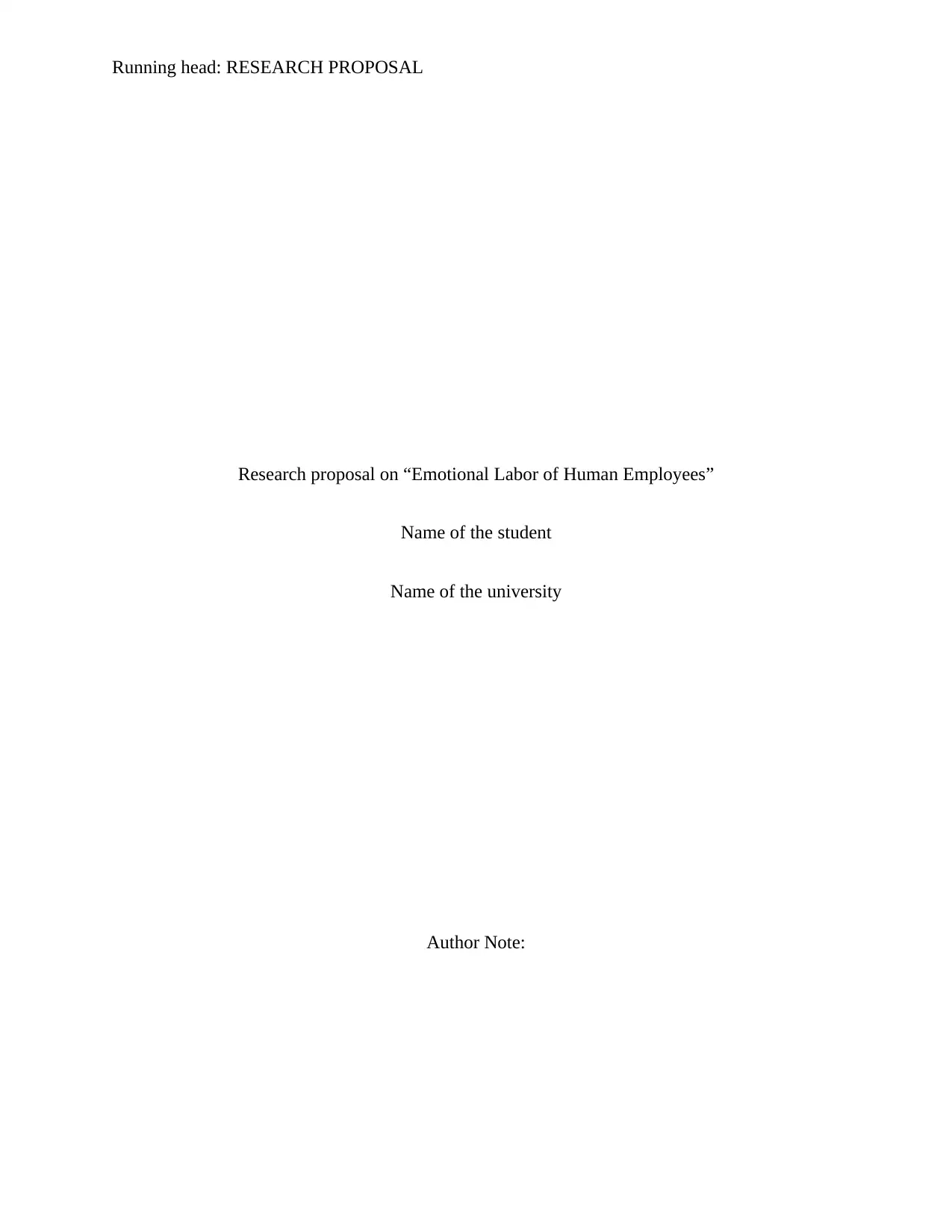
Running head: RESEARCH PROPOSAL
Research proposal on “Emotional Labor of Human Employees”
Name of the student
Name of the university
Author Note:
Research proposal on “Emotional Labor of Human Employees”
Name of the student
Name of the university
Author Note:
Paraphrase This Document
Need a fresh take? Get an instant paraphrase of this document with our AI Paraphraser
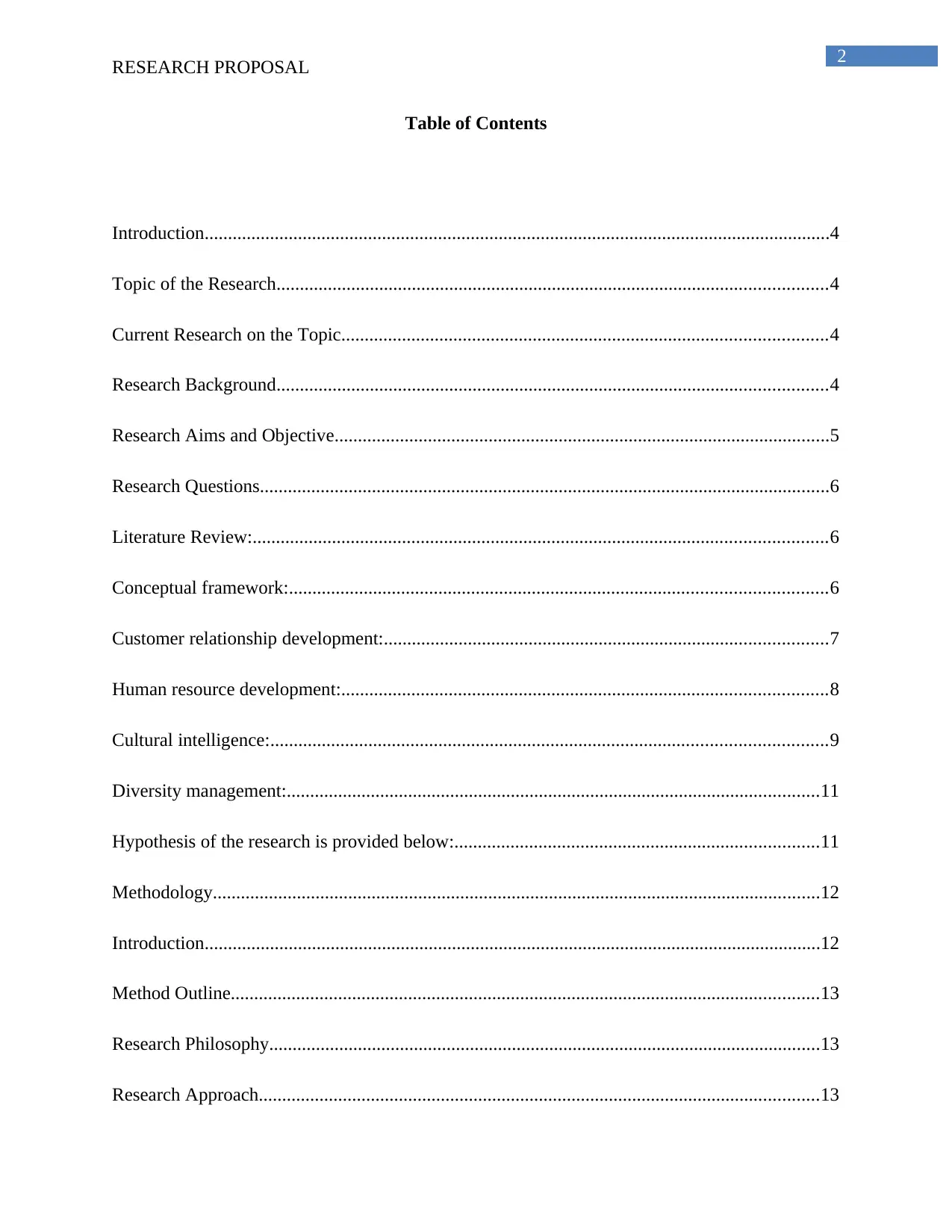
2
RESEARCH PROPOSAL
Table of Contents
Introduction......................................................................................................................................4
Topic of the Research......................................................................................................................4
Current Research on the Topic........................................................................................................4
Research Background......................................................................................................................4
Research Aims and Objective..........................................................................................................5
Research Questions..........................................................................................................................6
Literature Review:...........................................................................................................................6
Conceptual framework:...................................................................................................................6
Customer relationship development:...............................................................................................7
Human resource development:........................................................................................................8
Cultural intelligence:.......................................................................................................................9
Diversity management:..................................................................................................................11
Hypothesis of the research is provided below:..............................................................................11
Methodology..................................................................................................................................12
Introduction....................................................................................................................................12
Method Outline..............................................................................................................................13
Research Philosophy......................................................................................................................13
Research Approach........................................................................................................................13
RESEARCH PROPOSAL
Table of Contents
Introduction......................................................................................................................................4
Topic of the Research......................................................................................................................4
Current Research on the Topic........................................................................................................4
Research Background......................................................................................................................4
Research Aims and Objective..........................................................................................................5
Research Questions..........................................................................................................................6
Literature Review:...........................................................................................................................6
Conceptual framework:...................................................................................................................6
Customer relationship development:...............................................................................................7
Human resource development:........................................................................................................8
Cultural intelligence:.......................................................................................................................9
Diversity management:..................................................................................................................11
Hypothesis of the research is provided below:..............................................................................11
Methodology..................................................................................................................................12
Introduction....................................................................................................................................12
Method Outline..............................................................................................................................13
Research Philosophy......................................................................................................................13
Research Approach........................................................................................................................13
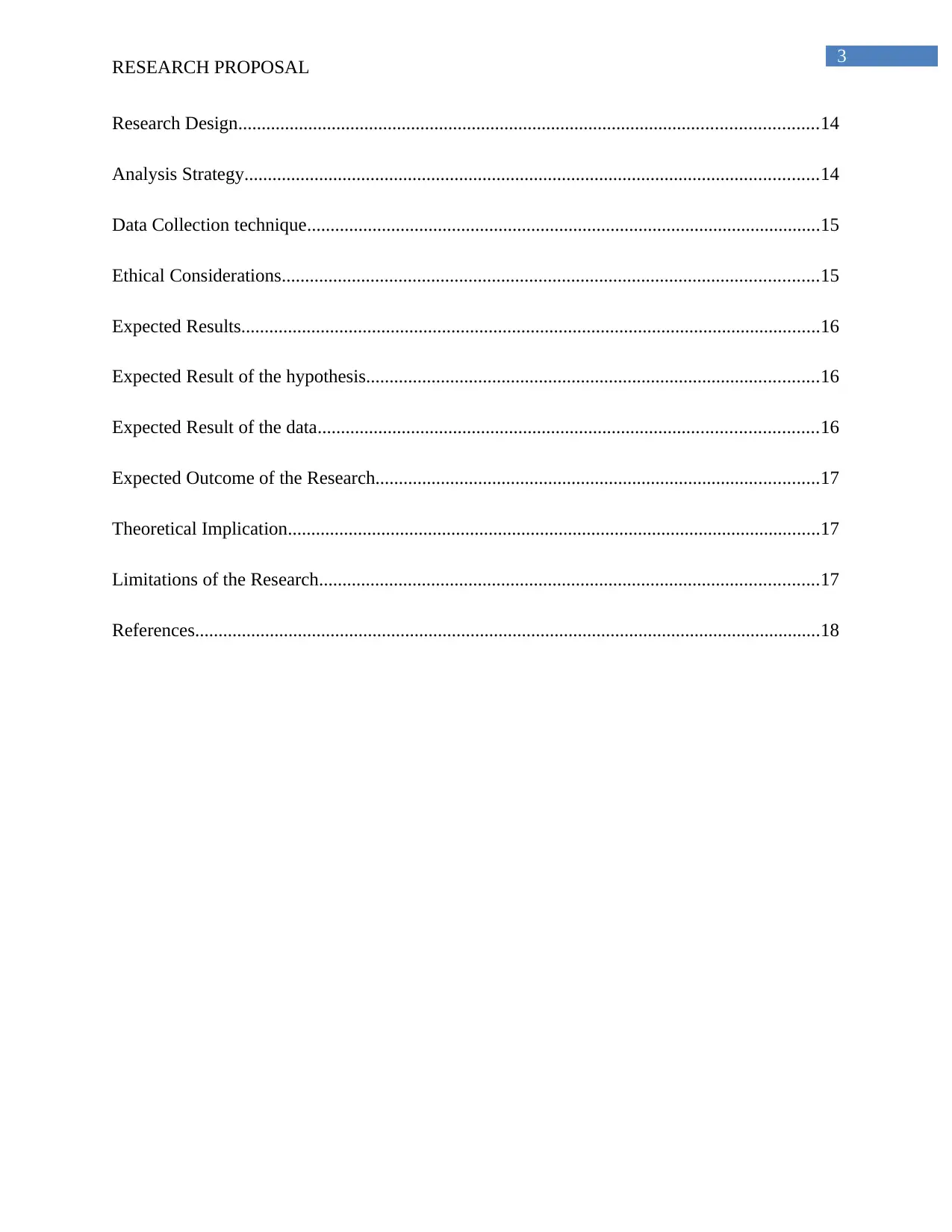
3
RESEARCH PROPOSAL
Research Design............................................................................................................................14
Analysis Strategy...........................................................................................................................14
Data Collection technique..............................................................................................................15
Ethical Considerations...................................................................................................................15
Expected Results............................................................................................................................16
Expected Result of the hypothesis.................................................................................................16
Expected Result of the data...........................................................................................................16
Expected Outcome of the Research...............................................................................................17
Theoretical Implication..................................................................................................................17
Limitations of the Research...........................................................................................................17
References......................................................................................................................................18
RESEARCH PROPOSAL
Research Design............................................................................................................................14
Analysis Strategy...........................................................................................................................14
Data Collection technique..............................................................................................................15
Ethical Considerations...................................................................................................................15
Expected Results............................................................................................................................16
Expected Result of the hypothesis.................................................................................................16
Expected Result of the data...........................................................................................................16
Expected Outcome of the Research...............................................................................................17
Theoretical Implication..................................................................................................................17
Limitations of the Research...........................................................................................................17
References......................................................................................................................................18
⊘ This is a preview!⊘
Do you want full access?
Subscribe today to unlock all pages.

Trusted by 1+ million students worldwide
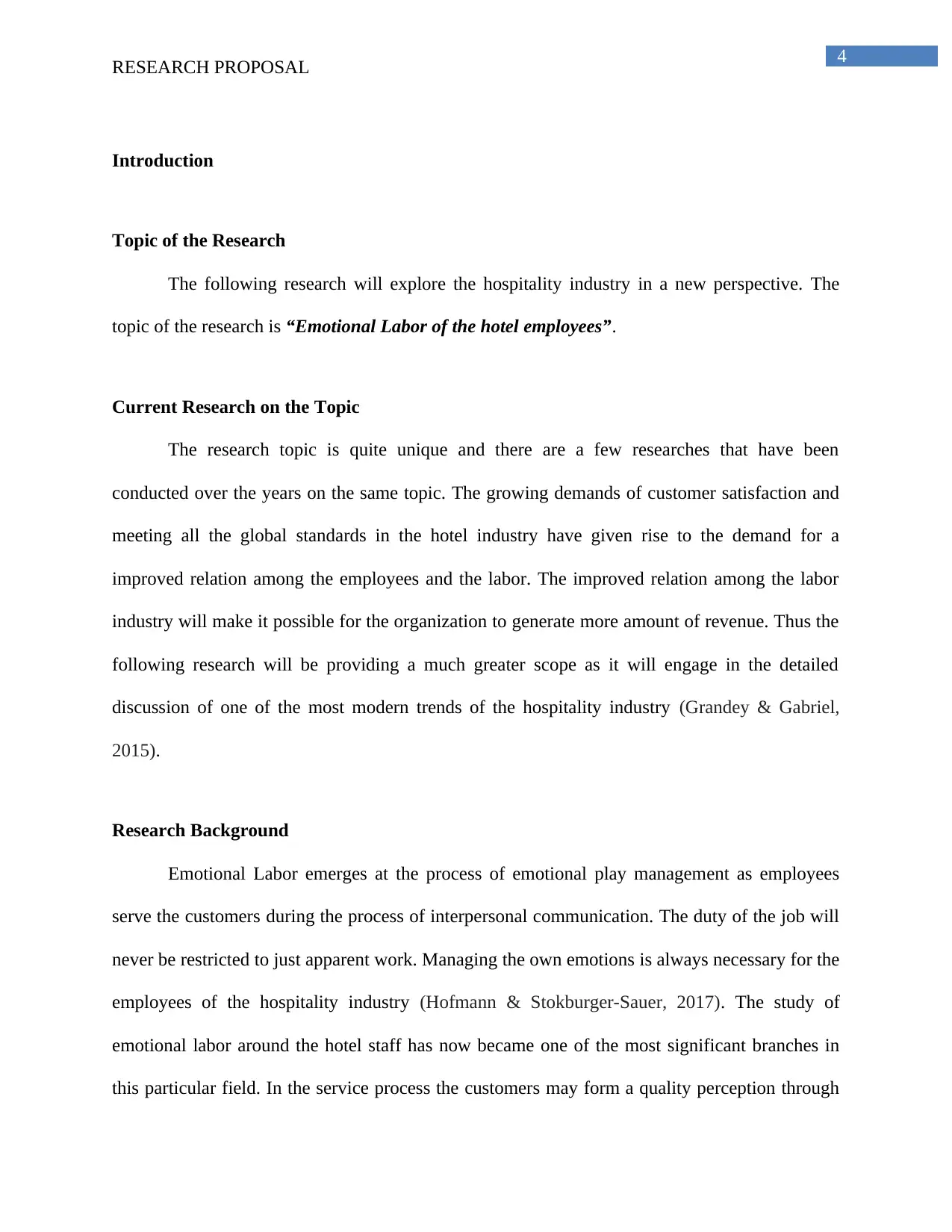
4
RESEARCH PROPOSAL
Introduction
Topic of the Research
The following research will explore the hospitality industry in a new perspective. The
topic of the research is “Emotional Labor of the hotel employees”.
Current Research on the Topic
The research topic is quite unique and there are a few researches that have been
conducted over the years on the same topic. The growing demands of customer satisfaction and
meeting all the global standards in the hotel industry have given rise to the demand for a
improved relation among the employees and the labor. The improved relation among the labor
industry will make it possible for the organization to generate more amount of revenue. Thus the
following research will be providing a much greater scope as it will engage in the detailed
discussion of one of the most modern trends of the hospitality industry (Grandey & Gabriel,
2015).
Research Background
Emotional Labor emerges at the process of emotional play management as employees
serve the customers during the process of interpersonal communication. The duty of the job will
never be restricted to just apparent work. Managing the own emotions is always necessary for the
employees of the hospitality industry (Hofmann & Stokburger-Sauer, 2017). The study of
emotional labor around the hotel staff has now became one of the most significant branches in
this particular field. In the service process the customers may form a quality perception through
RESEARCH PROPOSAL
Introduction
Topic of the Research
The following research will explore the hospitality industry in a new perspective. The
topic of the research is “Emotional Labor of the hotel employees”.
Current Research on the Topic
The research topic is quite unique and there are a few researches that have been
conducted over the years on the same topic. The growing demands of customer satisfaction and
meeting all the global standards in the hotel industry have given rise to the demand for a
improved relation among the employees and the labor. The improved relation among the labor
industry will make it possible for the organization to generate more amount of revenue. Thus the
following research will be providing a much greater scope as it will engage in the detailed
discussion of one of the most modern trends of the hospitality industry (Grandey & Gabriel,
2015).
Research Background
Emotional Labor emerges at the process of emotional play management as employees
serve the customers during the process of interpersonal communication. The duty of the job will
never be restricted to just apparent work. Managing the own emotions is always necessary for the
employees of the hospitality industry (Hofmann & Stokburger-Sauer, 2017). The study of
emotional labor around the hotel staff has now became one of the most significant branches in
this particular field. In the service process the customers may form a quality perception through
Paraphrase This Document
Need a fresh take? Get an instant paraphrase of this document with our AI Paraphraser
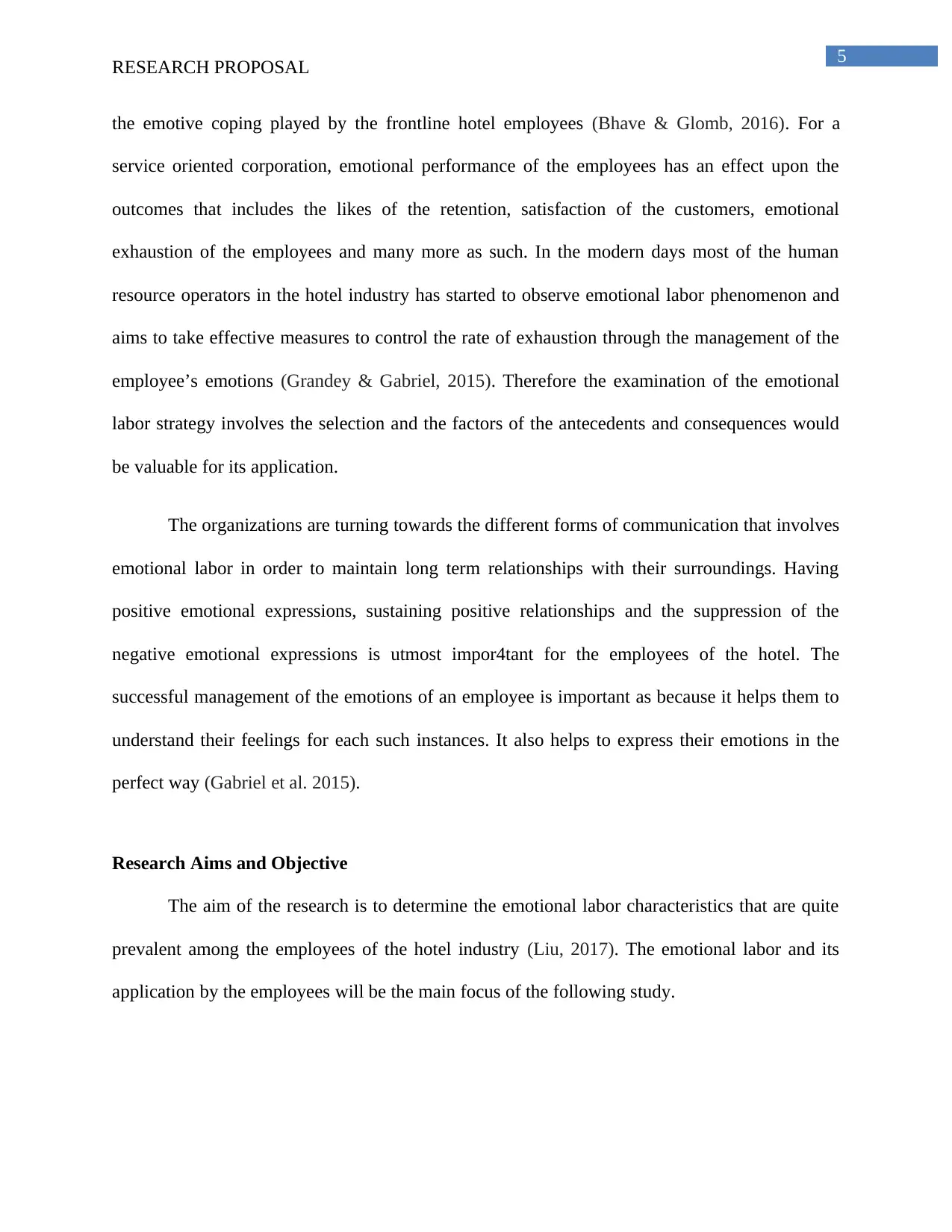
5
RESEARCH PROPOSAL
the emotive coping played by the frontline hotel employees (Bhave & Glomb, 2016). For a
service oriented corporation, emotional performance of the employees has an effect upon the
outcomes that includes the likes of the retention, satisfaction of the customers, emotional
exhaustion of the employees and many more as such. In the modern days most of the human
resource operators in the hotel industry has started to observe emotional labor phenomenon and
aims to take effective measures to control the rate of exhaustion through the management of the
employee’s emotions (Grandey & Gabriel, 2015). Therefore the examination of the emotional
labor strategy involves the selection and the factors of the antecedents and consequences would
be valuable for its application.
The organizations are turning towards the different forms of communication that involves
emotional labor in order to maintain long term relationships with their surroundings. Having
positive emotional expressions, sustaining positive relationships and the suppression of the
negative emotional expressions is utmost impor4tant for the employees of the hotel. The
successful management of the emotions of an employee is important as because it helps them to
understand their feelings for each such instances. It also helps to express their emotions in the
perfect way (Gabriel et al. 2015).
Research Aims and Objective
The aim of the research is to determine the emotional labor characteristics that are quite
prevalent among the employees of the hotel industry (Liu, 2017). The emotional labor and its
application by the employees will be the main focus of the following study.
RESEARCH PROPOSAL
the emotive coping played by the frontline hotel employees (Bhave & Glomb, 2016). For a
service oriented corporation, emotional performance of the employees has an effect upon the
outcomes that includes the likes of the retention, satisfaction of the customers, emotional
exhaustion of the employees and many more as such. In the modern days most of the human
resource operators in the hotel industry has started to observe emotional labor phenomenon and
aims to take effective measures to control the rate of exhaustion through the management of the
employee’s emotions (Grandey & Gabriel, 2015). Therefore the examination of the emotional
labor strategy involves the selection and the factors of the antecedents and consequences would
be valuable for its application.
The organizations are turning towards the different forms of communication that involves
emotional labor in order to maintain long term relationships with their surroundings. Having
positive emotional expressions, sustaining positive relationships and the suppression of the
negative emotional expressions is utmost impor4tant for the employees of the hotel. The
successful management of the emotions of an employee is important as because it helps them to
understand their feelings for each such instances. It also helps to express their emotions in the
perfect way (Gabriel et al. 2015).
Research Aims and Objective
The aim of the research is to determine the emotional labor characteristics that are quite
prevalent among the employees of the hotel industry (Liu, 2017). The emotional labor and its
application by the employees will be the main focus of the following study.
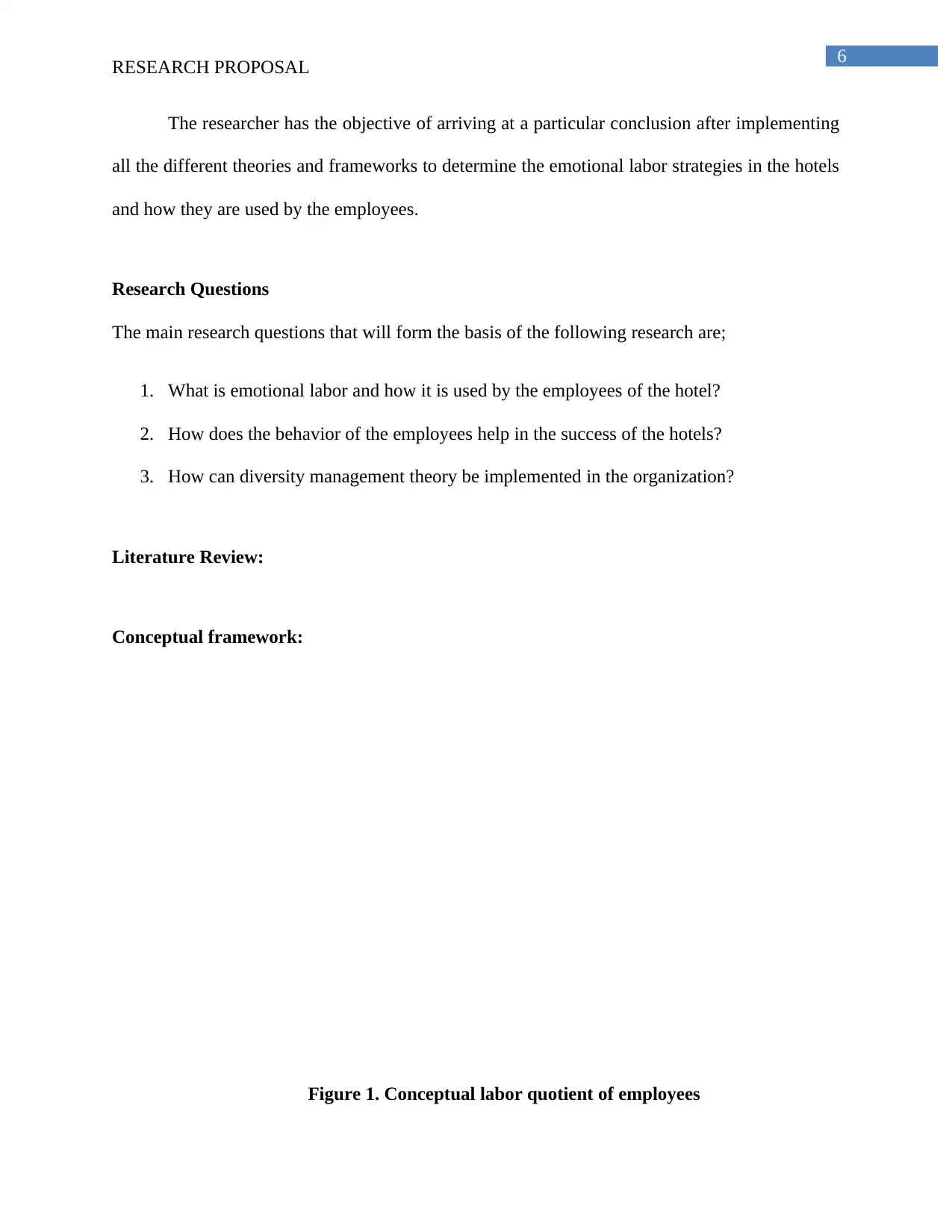
6
RESEARCH PROPOSAL
The researcher has the objective of arriving at a particular conclusion after implementing
all the different theories and frameworks to determine the emotional labor strategies in the hotels
and how they are used by the employees.
Research Questions
The main research questions that will form the basis of the following research are;
1. What is emotional labor and how it is used by the employees of the hotel?
2. How does the behavior of the employees help in the success of the hotels?
3. How can diversity management theory be implemented in the organization?
Literature Review:
Conceptual framework:
Figure 1. Conceptual labor quotient of employees
RESEARCH PROPOSAL
The researcher has the objective of arriving at a particular conclusion after implementing
all the different theories and frameworks to determine the emotional labor strategies in the hotels
and how they are used by the employees.
Research Questions
The main research questions that will form the basis of the following research are;
1. What is emotional labor and how it is used by the employees of the hotel?
2. How does the behavior of the employees help in the success of the hotels?
3. How can diversity management theory be implemented in the organization?
Literature Review:
Conceptual framework:
Figure 1. Conceptual labor quotient of employees
⊘ This is a preview!⊘
Do you want full access?
Subscribe today to unlock all pages.

Trusted by 1+ million students worldwide
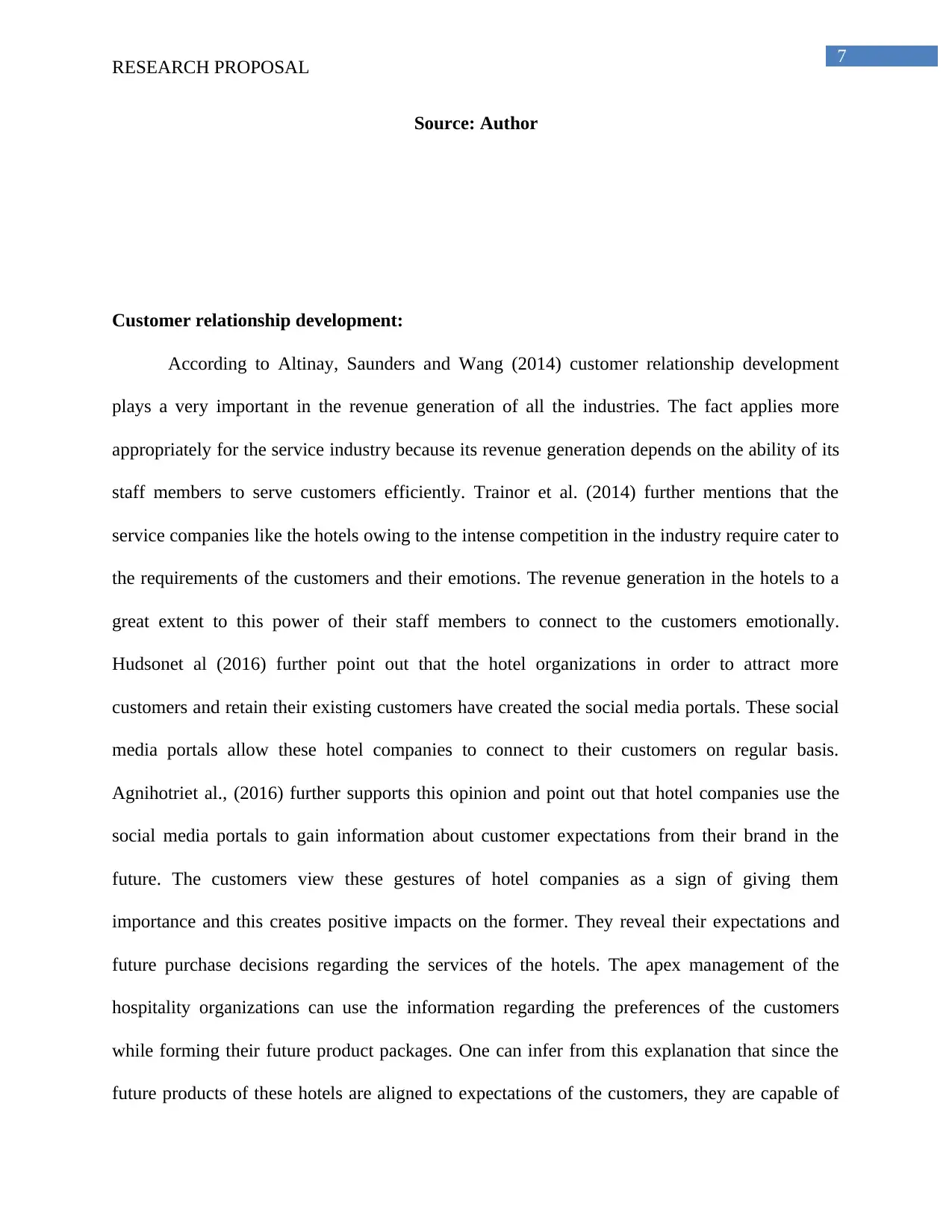
7
RESEARCH PROPOSAL
Source: Author
Customer relationship development:
According to Altinay, Saunders and Wang (2014) customer relationship development
plays a very important in the revenue generation of all the industries. The fact applies more
appropriately for the service industry because its revenue generation depends on the ability of its
staff members to serve customers efficiently. Trainor et al. (2014) further mentions that the
service companies like the hotels owing to the intense competition in the industry require cater to
the requirements of the customers and their emotions. The revenue generation in the hotels to a
great extent to this power of their staff members to connect to the customers emotionally.
Hudsonet al (2016) further point out that the hotel organizations in order to attract more
customers and retain their existing customers have created the social media portals. These social
media portals allow these hotel companies to connect to their customers on regular basis.
Agnihotriet al., (2016) further supports this opinion and point out that hotel companies use the
social media portals to gain information about customer expectations from their brand in the
future. The customers view these gestures of hotel companies as a sign of giving them
importance and this creates positive impacts on the former. They reveal their expectations and
future purchase decisions regarding the services of the hotels. The apex management of the
hospitality organizations can use the information regarding the preferences of the customers
while forming their future product packages. One can infer from this explanation that since the
future products of these hotels are aligned to expectations of the customers, they are capable of
RESEARCH PROPOSAL
Source: Author
Customer relationship development:
According to Altinay, Saunders and Wang (2014) customer relationship development
plays a very important in the revenue generation of all the industries. The fact applies more
appropriately for the service industry because its revenue generation depends on the ability of its
staff members to serve customers efficiently. Trainor et al. (2014) further mentions that the
service companies like the hotels owing to the intense competition in the industry require cater to
the requirements of the customers and their emotions. The revenue generation in the hotels to a
great extent to this power of their staff members to connect to the customers emotionally.
Hudsonet al (2016) further point out that the hotel organizations in order to attract more
customers and retain their existing customers have created the social media portals. These social
media portals allow these hotel companies to connect to their customers on regular basis.
Agnihotriet al., (2016) further supports this opinion and point out that hotel companies use the
social media portals to gain information about customer expectations from their brand in the
future. The customers view these gestures of hotel companies as a sign of giving them
importance and this creates positive impacts on the former. They reveal their expectations and
future purchase decisions regarding the services of the hotels. The apex management of the
hospitality organizations can use the information regarding the preferences of the customers
while forming their future product packages. One can infer from this explanation that since the
future products of these hotels are aligned to expectations of the customers, they are capable of
Paraphrase This Document
Need a fresh take? Get an instant paraphrase of this document with our AI Paraphraser
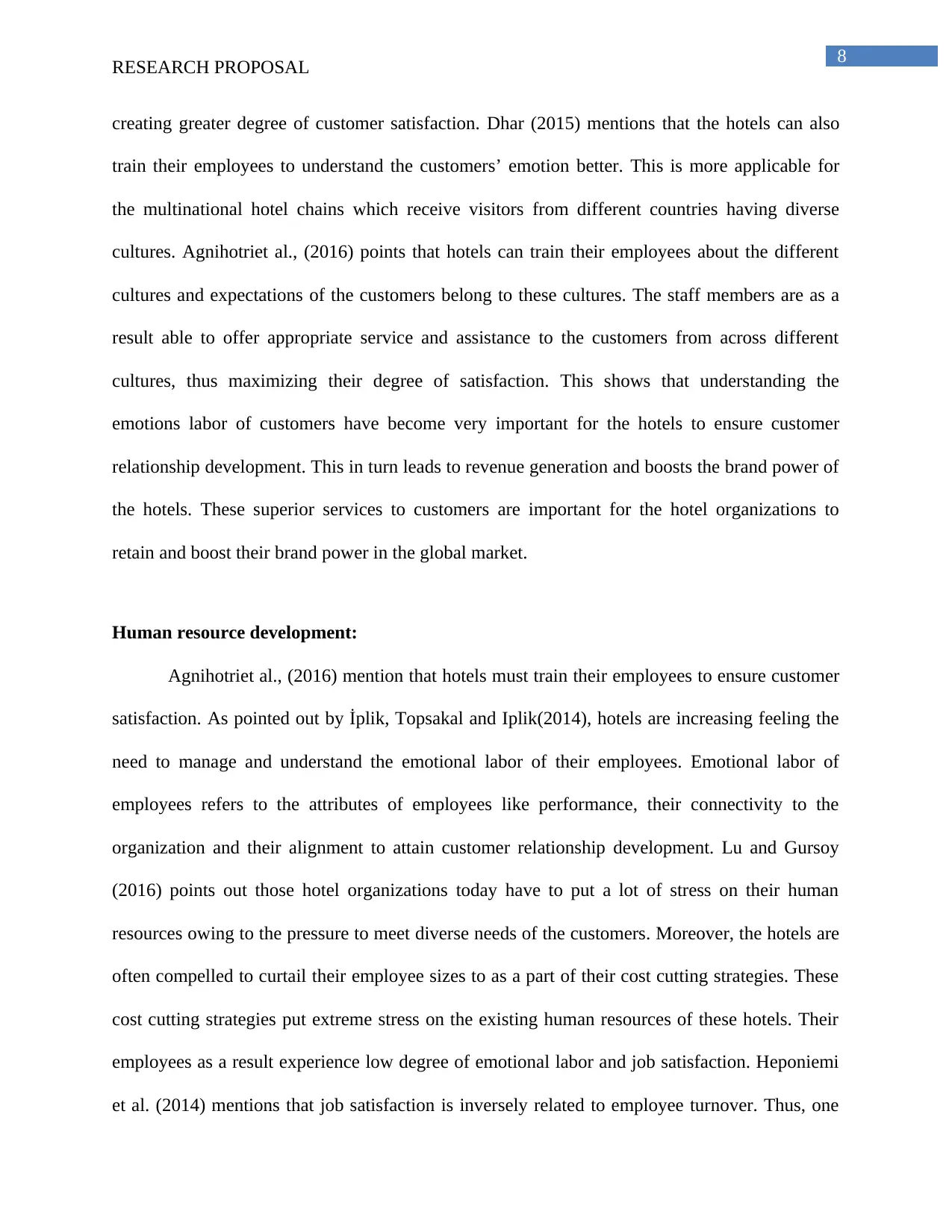
8
RESEARCH PROPOSAL
creating greater degree of customer satisfaction. Dhar (2015) mentions that the hotels can also
train their employees to understand the customers’ emotion better. This is more applicable for
the multinational hotel chains which receive visitors from different countries having diverse
cultures. Agnihotriet al., (2016) points that hotels can train their employees about the different
cultures and expectations of the customers belong to these cultures. The staff members are as a
result able to offer appropriate service and assistance to the customers from across different
cultures, thus maximizing their degree of satisfaction. This shows that understanding the
emotions labor of customers have become very important for the hotels to ensure customer
relationship development. This in turn leads to revenue generation and boosts the brand power of
the hotels. These superior services to customers are important for the hotel organizations to
retain and boost their brand power in the global market.
Human resource development:
Agnihotriet al., (2016) mention that hotels must train their employees to ensure customer
satisfaction. As pointed out by İplik, Topsakal and Iplik(2014), hotels are increasing feeling the
need to manage and understand the emotional labor of their employees. Emotional labor of
employees refers to the attributes of employees like performance, their connectivity to the
organization and their alignment to attain customer relationship development. Lu and Gursoy
(2016) points out those hotel organizations today have to put a lot of stress on their human
resources owing to the pressure to meet diverse needs of the customers. Moreover, the hotels are
often compelled to curtail their employee sizes to as a part of their cost cutting strategies. These
cost cutting strategies put extreme stress on the existing human resources of these hotels. Their
employees as a result experience low degree of emotional labor and job satisfaction. Heponiemi
et al. (2014) mentions that job satisfaction is inversely related to employee turnover. Thus, one
RESEARCH PROPOSAL
creating greater degree of customer satisfaction. Dhar (2015) mentions that the hotels can also
train their employees to understand the customers’ emotion better. This is more applicable for
the multinational hotel chains which receive visitors from different countries having diverse
cultures. Agnihotriet al., (2016) points that hotels can train their employees about the different
cultures and expectations of the customers belong to these cultures. The staff members are as a
result able to offer appropriate service and assistance to the customers from across different
cultures, thus maximizing their degree of satisfaction. This shows that understanding the
emotions labor of customers have become very important for the hotels to ensure customer
relationship development. This in turn leads to revenue generation and boosts the brand power of
the hotels. These superior services to customers are important for the hotel organizations to
retain and boost their brand power in the global market.
Human resource development:
Agnihotriet al., (2016) mention that hotels must train their employees to ensure customer
satisfaction. As pointed out by İplik, Topsakal and Iplik(2014), hotels are increasing feeling the
need to manage and understand the emotional labor of their employees. Emotional labor of
employees refers to the attributes of employees like performance, their connectivity to the
organization and their alignment to attain customer relationship development. Lu and Gursoy
(2016) points out those hotel organizations today have to put a lot of stress on their human
resources owing to the pressure to meet diverse needs of the customers. Moreover, the hotels are
often compelled to curtail their employee sizes to as a part of their cost cutting strategies. These
cost cutting strategies put extreme stress on the existing human resources of these hotels. Their
employees as a result experience low degree of emotional labor and job satisfaction. Heponiemi
et al. (2014) mentions that job satisfaction is inversely related to employee turnover. Thus, one
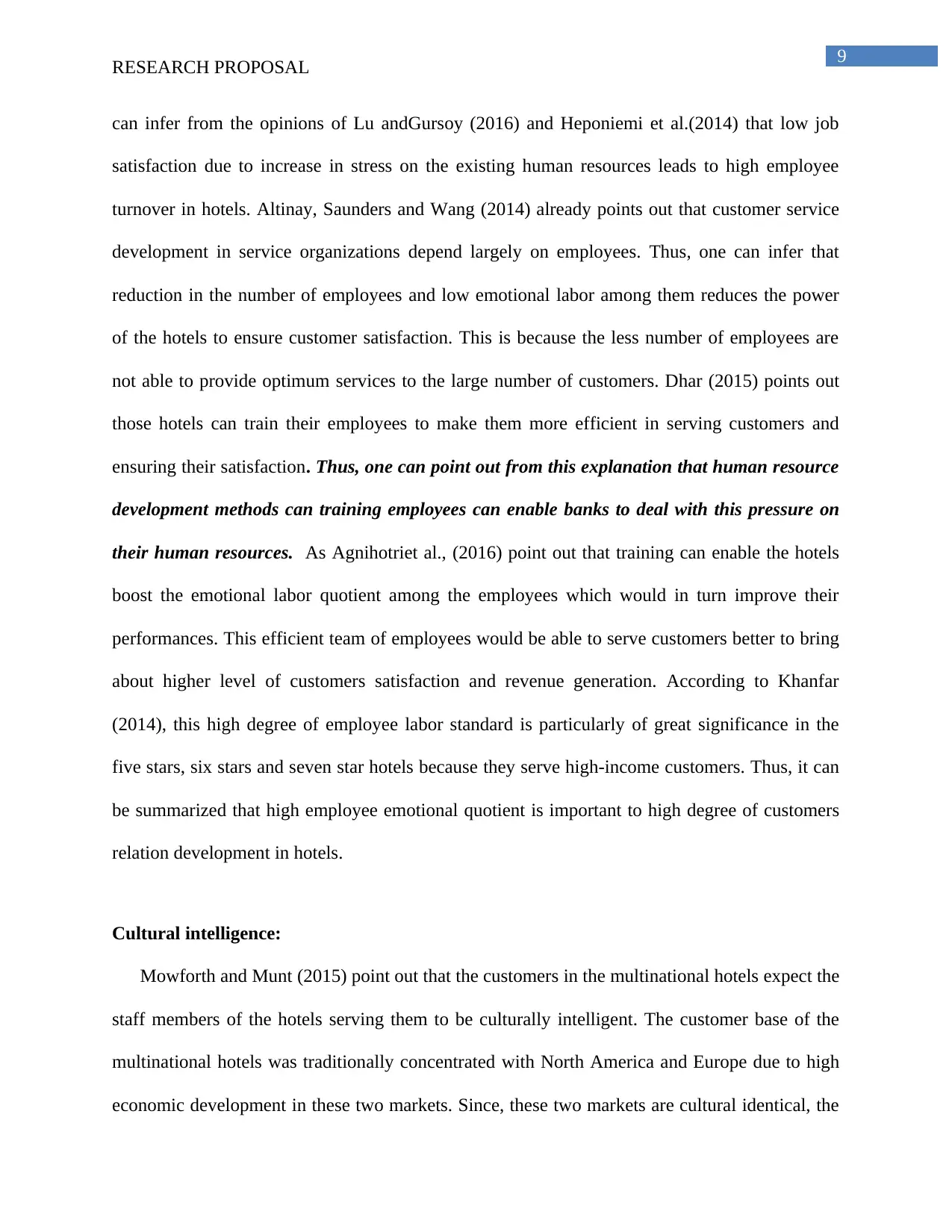
9
RESEARCH PROPOSAL
can infer from the opinions of Lu andGursoy (2016) and Heponiemi et al.(2014) that low job
satisfaction due to increase in stress on the existing human resources leads to high employee
turnover in hotels. Altinay, Saunders and Wang (2014) already points out that customer service
development in service organizations depend largely on employees. Thus, one can infer that
reduction in the number of employees and low emotional labor among them reduces the power
of the hotels to ensure customer satisfaction. This is because the less number of employees are
not able to provide optimum services to the large number of customers. Dhar (2015) points out
those hotels can train their employees to make them more efficient in serving customers and
ensuring their satisfaction. Thus, one can point out from this explanation that human resource
development methods can training employees can enable banks to deal with this pressure on
their human resources. As Agnihotriet al., (2016) point out that training can enable the hotels
boost the emotional labor quotient among the employees which would in turn improve their
performances. This efficient team of employees would be able to serve customers better to bring
about higher level of customers satisfaction and revenue generation. According to Khanfar
(2014), this high degree of employee labor standard is particularly of great significance in the
five stars, six stars and seven star hotels because they serve high-income customers. Thus, it can
be summarized that high employee emotional quotient is important to high degree of customers
relation development in hotels.
Cultural intelligence:
Mowforth and Munt (2015) point out that the customers in the multinational hotels expect the
staff members of the hotels serving them to be culturally intelligent. The customer base of the
multinational hotels was traditionally concentrated with North America and Europe due to high
economic development in these two markets. Since, these two markets are cultural identical, the
RESEARCH PROPOSAL
can infer from the opinions of Lu andGursoy (2016) and Heponiemi et al.(2014) that low job
satisfaction due to increase in stress on the existing human resources leads to high employee
turnover in hotels. Altinay, Saunders and Wang (2014) already points out that customer service
development in service organizations depend largely on employees. Thus, one can infer that
reduction in the number of employees and low emotional labor among them reduces the power
of the hotels to ensure customer satisfaction. This is because the less number of employees are
not able to provide optimum services to the large number of customers. Dhar (2015) points out
those hotels can train their employees to make them more efficient in serving customers and
ensuring their satisfaction. Thus, one can point out from this explanation that human resource
development methods can training employees can enable banks to deal with this pressure on
their human resources. As Agnihotriet al., (2016) point out that training can enable the hotels
boost the emotional labor quotient among the employees which would in turn improve their
performances. This efficient team of employees would be able to serve customers better to bring
about higher level of customers satisfaction and revenue generation. According to Khanfar
(2014), this high degree of employee labor standard is particularly of great significance in the
five stars, six stars and seven star hotels because they serve high-income customers. Thus, it can
be summarized that high employee emotional quotient is important to high degree of customers
relation development in hotels.
Cultural intelligence:
Mowforth and Munt (2015) point out that the customers in the multinational hotels expect the
staff members of the hotels serving them to be culturally intelligent. The customer base of the
multinational hotels was traditionally concentrated with North America and Europe due to high
economic development in these two markets. Since, these two markets are cultural identical, the
⊘ This is a preview!⊘
Do you want full access?
Subscribe today to unlock all pages.

Trusted by 1+ million students worldwide
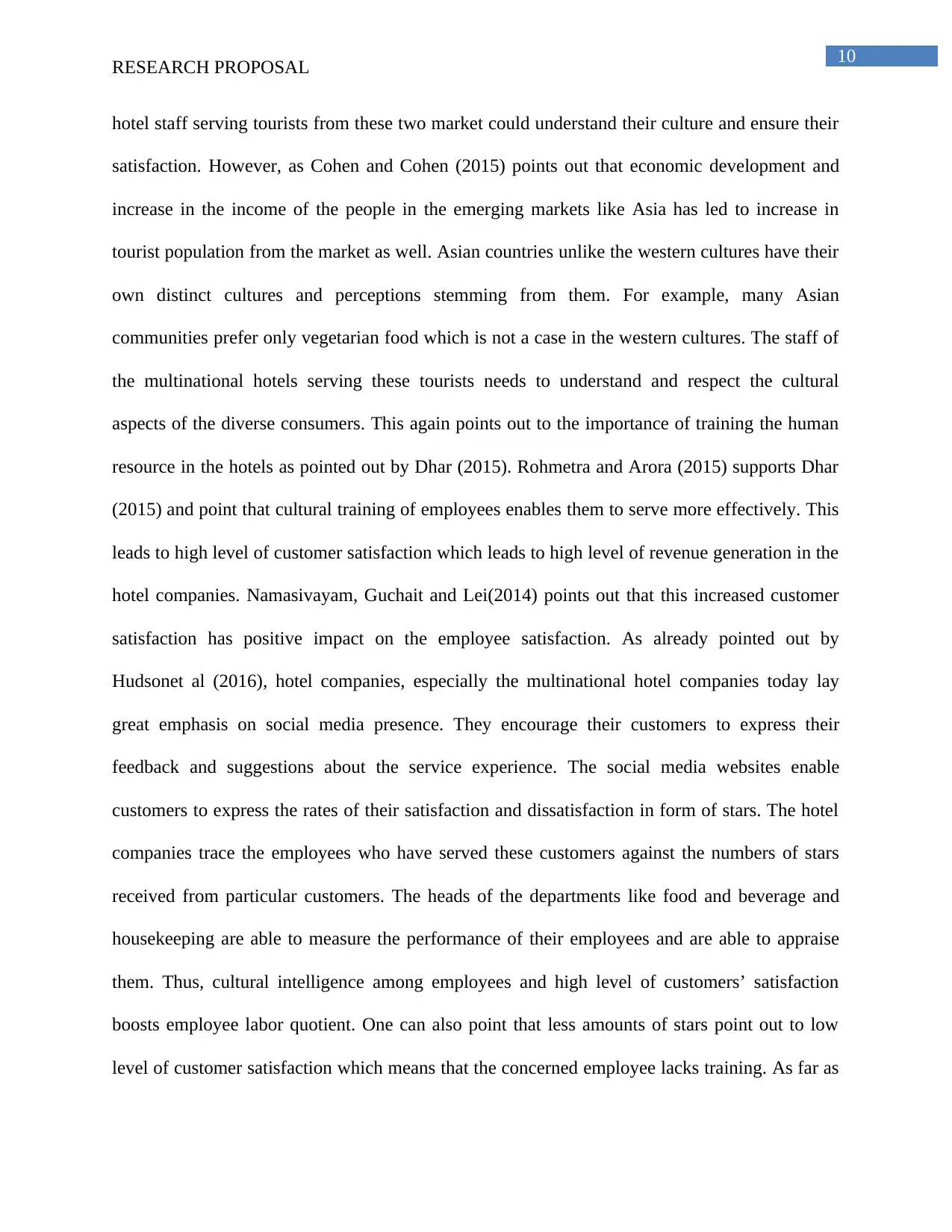
10
RESEARCH PROPOSAL
hotel staff serving tourists from these two market could understand their culture and ensure their
satisfaction. However, as Cohen and Cohen (2015) points out that economic development and
increase in the income of the people in the emerging markets like Asia has led to increase in
tourist population from the market as well. Asian countries unlike the western cultures have their
own distinct cultures and perceptions stemming from them. For example, many Asian
communities prefer only vegetarian food which is not a case in the western cultures. The staff of
the multinational hotels serving these tourists needs to understand and respect the cultural
aspects of the diverse consumers. This again points out to the importance of training the human
resource in the hotels as pointed out by Dhar (2015). Rohmetra and Arora (2015) supports Dhar
(2015) and point that cultural training of employees enables them to serve more effectively. This
leads to high level of customer satisfaction which leads to high level of revenue generation in the
hotel companies. Namasivayam, Guchait and Lei(2014) points out that this increased customer
satisfaction has positive impact on the employee satisfaction. As already pointed out by
Hudsonet al (2016), hotel companies, especially the multinational hotel companies today lay
great emphasis on social media presence. They encourage their customers to express their
feedback and suggestions about the service experience. The social media websites enable
customers to express the rates of their satisfaction and dissatisfaction in form of stars. The hotel
companies trace the employees who have served these customers against the numbers of stars
received from particular customers. The heads of the departments like food and beverage and
housekeeping are able to measure the performance of their employees and are able to appraise
them. Thus, cultural intelligence among employees and high level of customers’ satisfaction
boosts employee labor quotient. One can also point that less amounts of stars point out to low
level of customer satisfaction which means that the concerned employee lacks training. As far as
RESEARCH PROPOSAL
hotel staff serving tourists from these two market could understand their culture and ensure their
satisfaction. However, as Cohen and Cohen (2015) points out that economic development and
increase in the income of the people in the emerging markets like Asia has led to increase in
tourist population from the market as well. Asian countries unlike the western cultures have their
own distinct cultures and perceptions stemming from them. For example, many Asian
communities prefer only vegetarian food which is not a case in the western cultures. The staff of
the multinational hotels serving these tourists needs to understand and respect the cultural
aspects of the diverse consumers. This again points out to the importance of training the human
resource in the hotels as pointed out by Dhar (2015). Rohmetra and Arora (2015) supports Dhar
(2015) and point that cultural training of employees enables them to serve more effectively. This
leads to high level of customer satisfaction which leads to high level of revenue generation in the
hotel companies. Namasivayam, Guchait and Lei(2014) points out that this increased customer
satisfaction has positive impact on the employee satisfaction. As already pointed out by
Hudsonet al (2016), hotel companies, especially the multinational hotel companies today lay
great emphasis on social media presence. They encourage their customers to express their
feedback and suggestions about the service experience. The social media websites enable
customers to express the rates of their satisfaction and dissatisfaction in form of stars. The hotel
companies trace the employees who have served these customers against the numbers of stars
received from particular customers. The heads of the departments like food and beverage and
housekeeping are able to measure the performance of their employees and are able to appraise
them. Thus, cultural intelligence among employees and high level of customers’ satisfaction
boosts employee labor quotient. One can also point that less amounts of stars point out to low
level of customer satisfaction which means that the concerned employee lacks training. As far as
Paraphrase This Document
Need a fresh take? Get an instant paraphrase of this document with our AI Paraphraser
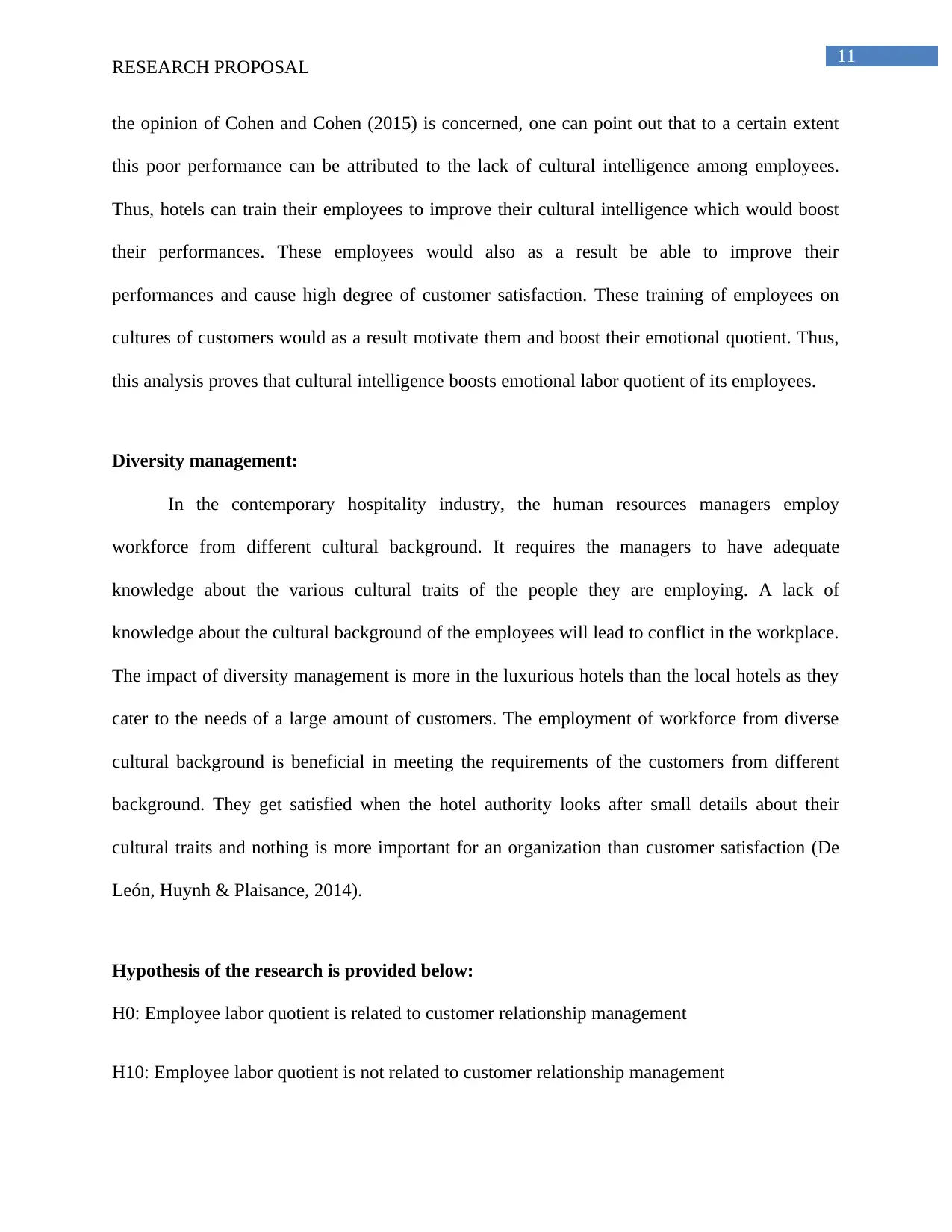
11
RESEARCH PROPOSAL
the opinion of Cohen and Cohen (2015) is concerned, one can point out that to a certain extent
this poor performance can be attributed to the lack of cultural intelligence among employees.
Thus, hotels can train their employees to improve their cultural intelligence which would boost
their performances. These employees would also as a result be able to improve their
performances and cause high degree of customer satisfaction. These training of employees on
cultures of customers would as a result motivate them and boost their emotional quotient. Thus,
this analysis proves that cultural intelligence boosts emotional labor quotient of its employees.
Diversity management:
In the contemporary hospitality industry, the human resources managers employ
workforce from different cultural background. It requires the managers to have adequate
knowledge about the various cultural traits of the people they are employing. A lack of
knowledge about the cultural background of the employees will lead to conflict in the workplace.
The impact of diversity management is more in the luxurious hotels than the local hotels as they
cater to the needs of a large amount of customers. The employment of workforce from diverse
cultural background is beneficial in meeting the requirements of the customers from different
background. They get satisfied when the hotel authority looks after small details about their
cultural traits and nothing is more important for an organization than customer satisfaction (De
León, Huynh & Plaisance, 2014).
Hypothesis of the research is provided below:
H0: Employee labor quotient is related to customer relationship management
H10: Employee labor quotient is not related to customer relationship management
RESEARCH PROPOSAL
the opinion of Cohen and Cohen (2015) is concerned, one can point out that to a certain extent
this poor performance can be attributed to the lack of cultural intelligence among employees.
Thus, hotels can train their employees to improve their cultural intelligence which would boost
their performances. These employees would also as a result be able to improve their
performances and cause high degree of customer satisfaction. These training of employees on
cultures of customers would as a result motivate them and boost their emotional quotient. Thus,
this analysis proves that cultural intelligence boosts emotional labor quotient of its employees.
Diversity management:
In the contemporary hospitality industry, the human resources managers employ
workforce from different cultural background. It requires the managers to have adequate
knowledge about the various cultural traits of the people they are employing. A lack of
knowledge about the cultural background of the employees will lead to conflict in the workplace.
The impact of diversity management is more in the luxurious hotels than the local hotels as they
cater to the needs of a large amount of customers. The employment of workforce from diverse
cultural background is beneficial in meeting the requirements of the customers from different
background. They get satisfied when the hotel authority looks after small details about their
cultural traits and nothing is more important for an organization than customer satisfaction (De
León, Huynh & Plaisance, 2014).
Hypothesis of the research is provided below:
H0: Employee labor quotient is related to customer relationship management
H10: Employee labor quotient is not related to customer relationship management
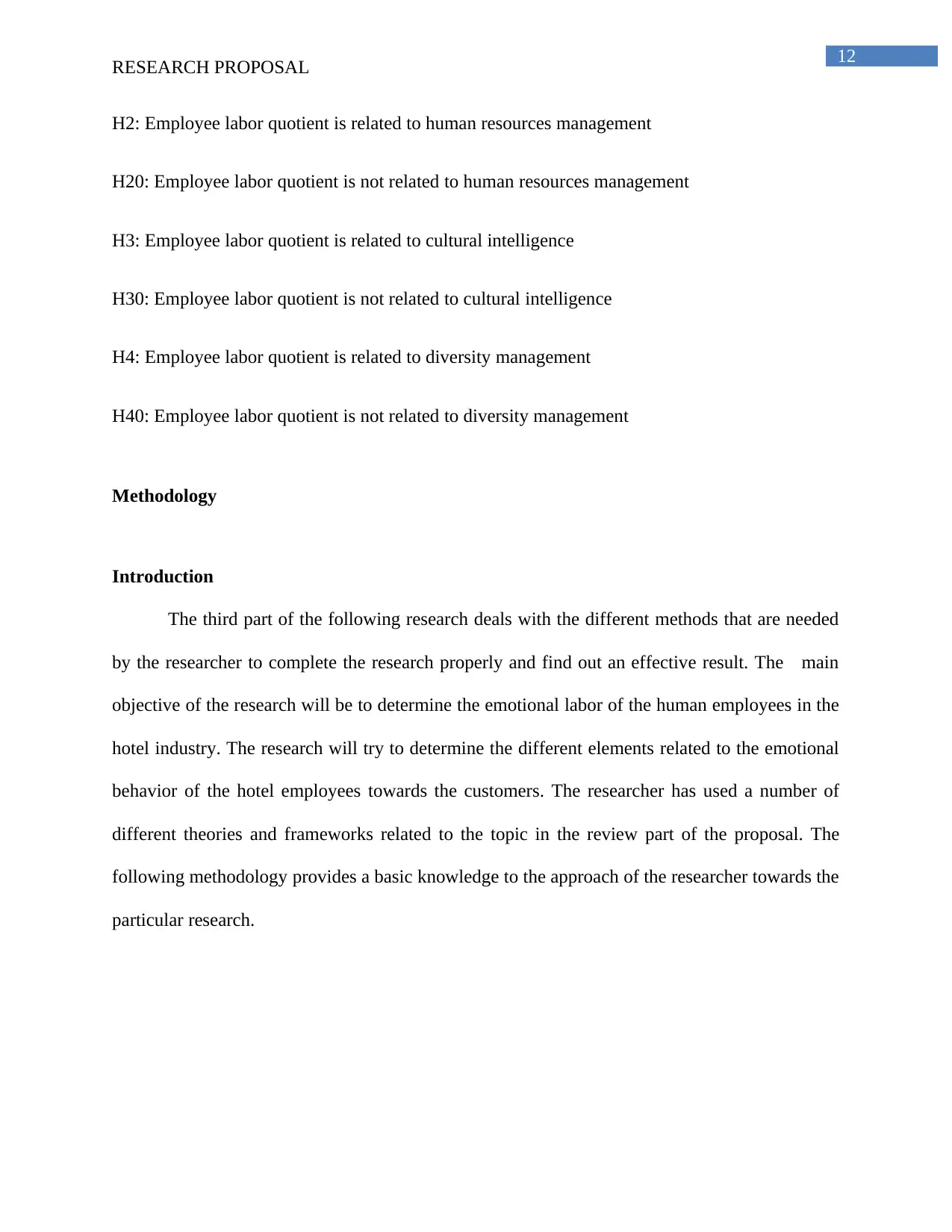
12
RESEARCH PROPOSAL
H2: Employee labor quotient is related to human resources management
H20: Employee labor quotient is not related to human resources management
H3: Employee labor quotient is related to cultural intelligence
H30: Employee labor quotient is not related to cultural intelligence
H4: Employee labor quotient is related to diversity management
H40: Employee labor quotient is not related to diversity management
Methodology
Introduction
The third part of the following research deals with the different methods that are needed
by the researcher to complete the research properly and find out an effective result. The main
objective of the research will be to determine the emotional labor of the human employees in the
hotel industry. The research will try to determine the different elements related to the emotional
behavior of the hotel employees towards the customers. The researcher has used a number of
different theories and frameworks related to the topic in the review part of the proposal. The
following methodology provides a basic knowledge to the approach of the researcher towards the
particular research.
RESEARCH PROPOSAL
H2: Employee labor quotient is related to human resources management
H20: Employee labor quotient is not related to human resources management
H3: Employee labor quotient is related to cultural intelligence
H30: Employee labor quotient is not related to cultural intelligence
H4: Employee labor quotient is related to diversity management
H40: Employee labor quotient is not related to diversity management
Methodology
Introduction
The third part of the following research deals with the different methods that are needed
by the researcher to complete the research properly and find out an effective result. The main
objective of the research will be to determine the emotional labor of the human employees in the
hotel industry. The research will try to determine the different elements related to the emotional
behavior of the hotel employees towards the customers. The researcher has used a number of
different theories and frameworks related to the topic in the review part of the proposal. The
following methodology provides a basic knowledge to the approach of the researcher towards the
particular research.
⊘ This is a preview!⊘
Do you want full access?
Subscribe today to unlock all pages.

Trusted by 1+ million students worldwide
1 out of 21
Related Documents
Your All-in-One AI-Powered Toolkit for Academic Success.
+13062052269
info@desklib.com
Available 24*7 on WhatsApp / Email
![[object Object]](/_next/static/media/star-bottom.7253800d.svg)
Unlock your academic potential
Copyright © 2020–2025 A2Z Services. All Rights Reserved. Developed and managed by ZUCOL.





